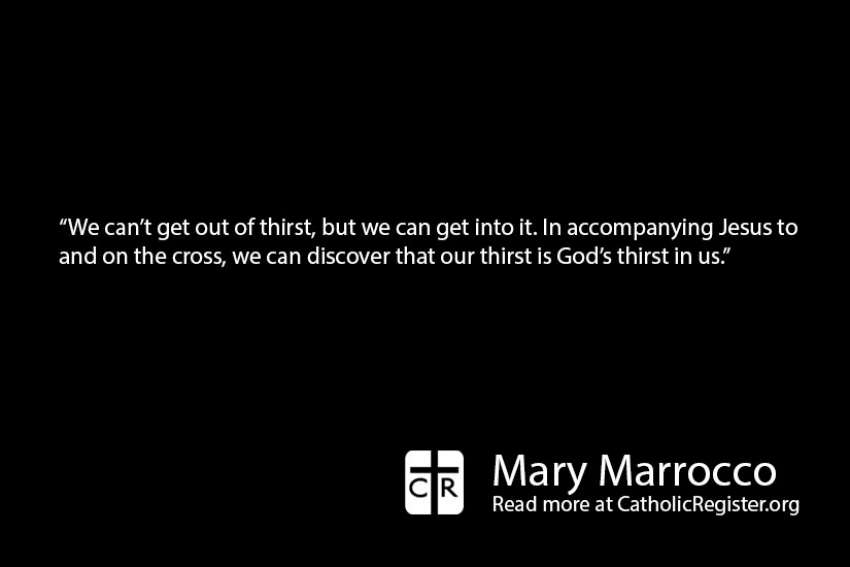I loved looking at it, drinking it and playing in it. Though I knew I needed it, I had never come anywhere near the limits of that need.
Then, a friend of mine went to work in an orphanage in Haiti. During a “coup d’état” there, she had to return to Canada temporarily. When visiting me, she kept turning off the water faucet I’d turned on, and scolding me for wasting water. Wasting water? Was that even a category?
Apparently, and certainly from that day on for me. Amidst all the desperate need she’d observed, she emphasized the need of water, its preciousness and the care taken to care for it.
She brought stories and pictures of the children and community she was getting to know. She’d visited Mother Teresa’s sisters in Port-au-Prince and loved their austere chapel: a white-draped altar, a white wall behind it, and stark and simple against the white, a dark bowed figure on a dark wooden cross. Written on the wall in dark plain lettering: I thirst. Arrested by the photograph, I marvelled that the Haitians had written their cry of thirst on the wall over the altar. Eventually, it broke in upon me that this was Jesus’ cry of thirst from the cross (John 19:28). Wait … whose cry was it … theirs or His? Who was the “I” crying out? Or were they two different cries at all?
Jesus, the Gospels leave no doubt, was unbearably thirsty amid the slow, tortuous asphyxiation of crucifixion. He wasn’t affecting thirst to make a good story or exaggerating it to teach a lesson. He cried out in the anguish of an unbearable need for water.
What was Jesus’ suffering on the cross? Centuries of thought, experience and reflection have been devoted to this question. John’s Gospel gives only three sentences Jesus spoke from the cross. The Evangelist wants us to know Jesus suffered thirst — physical, agonizing thirst. We humans get thirsty and we can’t get out of it. It’s part of being human, like it or not. Our need can turn us against each other. The battle for water is ancient, contemporary and perpetual in human history.
Yet our thirst really leads us somewhere else. In recording Jesus’ need of water, John’s Gospel also points to a different, equally human, need. There’s an emotional, psychological thirst in us, too: for one another, for connection and companionship, meaning and purpose, especially when we suffer.
This deep human longing is as burning as the physical thirst of the dying man on the cross, or of the deprived child suffering from the political chaos she didn’t create and cannot escape. Our thirst for water echoes the profound thirst inside us. Alcoholics discover their seemingly insatiable thirst is really, as in Carl Jung’s description of addiction, “a thirst for wholeness.”
All this we hear resounding poignantly across the centuries through these two simple words, given in John’s Gospel, “I thirst.”
We may be only vaguely aware of our physical thirst. Even more, we may be astonishingly unaware of our deeper thirst. Perhaps Jesus’ thirst is also for this, that we waken to our real, inner thirst.
And what is this inner thirst?
The white-walled Haitian chapel, the printed words, and the ambiguity in the “I” of “I thirst” confused me. Fortunately. That confusion opened me to a new awareness which changed everything.
The Haitians’ thirst is Jesus’ thirst. Even at my safe distance, I could feel Jesus’ thirst that these, His suffering people, be cared for. In the need of water. In the need not to be abandoned. In the need of Jesus Himself, the living water, the revelation of the one God who is Lord of life and shepherd of all.
Our thirst is God’s thirst — God’s thirst that we might have life, life to the full. Abundant life means only one thing: relationship and communion. Because of who God is, that’s the only life there is.
No wonder we can never get “out” of thirst.
We can’t get out of thirst, but we can get into it. In accompanying Jesus to and on the cross, we can discover that our thirst is God’s thirst in us.
In accompanying Jesus to humiliation, abandonment and death, we can receive our true humanity with its outer and inner thirst. In descending with Jesus into hell, where He conquers rather than being conquered, we can receive the gift of life, the human life God gives us and the divine life God equally shares with us.
In rising with Jesus from the tomb, we can receive one another, thirsty and weary and confused as we are, yet somehow radiant, luminous with the taste of living water on our lips and in our hearts.
(Marrocco can be reached at marrocco7@sympatico.ca)


